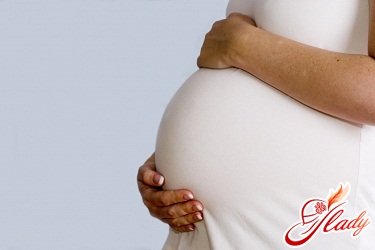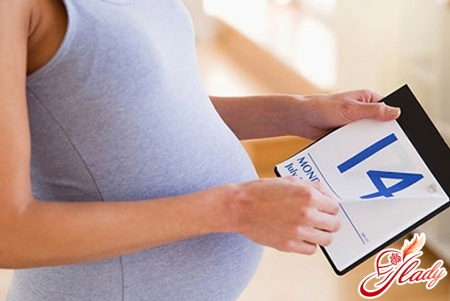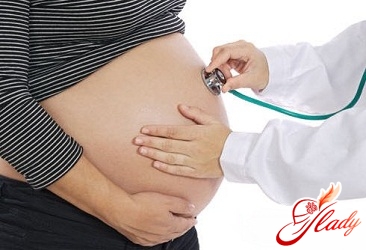 The desire to become a mother is the most natural thing forany woman. However, a woman is like a beautiful vase - also fragile and requires the most careful attitude to health. There is a huge number of various diseases that can prevent a woman from becoming a mother, as they significantly reduce the likelihood, and sometimes completely exclude the onset of pregnancy. And a woman in despair asks herself the same question over and over again - why can't I get pregnant? Sometimes the cause of infertility is mere trifles, from which modern medicine is able to rid a woman in the shortest possible time. So, for example, in response to a woman's question about whether it is possible to get pregnant with erosion, the doctor will simply smile. After all, he knows how to easily get rid of this problem. The same thing happens in a number of other cases. However, alas, the problem of infertility is not always solved so easily. Some diseases are so serious that women are forced to undergo long and painful treatment, and sometimes even resort to the most radical methods, such as IVF. But in most cases, diseases that prevent pregnancy are eliminated without much difficulty, provided that they are treated promptly and adequately. Pay special attention to the fact that almost any disease of the female reproductive system, left unattended by both the woman herself and doctors and, accordingly, in the absence of the necessary treatment, can sooner or later cause secondary infertility. And even if it seems to you that you will never have children again, remember that everything in our life is rapidly flowing and changing. And it is quite possible that in a few years you will bitterly regret your hasty decision. This article tells about the main diseases that doctors - gynecologists talk about in response to a woman's question about why she cannot get pregnant. However, remember that all information is provided for general information only and cannot serve as a guide to action - independent diagnosis and treatment. Remember that often the symptoms of various diseases can be very similar and, as a result, improper treatment can only worsen the woman's condition.
The desire to become a mother is the most natural thing forany woman. However, a woman is like a beautiful vase - also fragile and requires the most careful attitude to health. There is a huge number of various diseases that can prevent a woman from becoming a mother, as they significantly reduce the likelihood, and sometimes completely exclude the onset of pregnancy. And a woman in despair asks herself the same question over and over again - why can't I get pregnant? Sometimes the cause of infertility is mere trifles, from which modern medicine is able to rid a woman in the shortest possible time. So, for example, in response to a woman's question about whether it is possible to get pregnant with erosion, the doctor will simply smile. After all, he knows how to easily get rid of this problem. The same thing happens in a number of other cases. However, alas, the problem of infertility is not always solved so easily. Some diseases are so serious that women are forced to undergo long and painful treatment, and sometimes even resort to the most radical methods, such as IVF. But in most cases, diseases that prevent pregnancy are eliminated without much difficulty, provided that they are treated promptly and adequately. Pay special attention to the fact that almost any disease of the female reproductive system, left unattended by both the woman herself and doctors and, accordingly, in the absence of the necessary treatment, can sooner or later cause secondary infertility. And even if it seems to you that you will never have children again, remember that everything in our life is rapidly flowing and changing. And it is quite possible that in a few years you will bitterly regret your hasty decision. This article tells about the main diseases that doctors - gynecologists talk about in response to a woman's question about why she cannot get pregnant. However, remember that all information is provided for general information only and cannot serve as a guide to action - independent diagnosis and treatment. Remember that often the symptoms of various diseases can be very similar and, as a result, improper treatment can only worsen the woman's condition.
Thrush
Very often doctors may hear the question aboutIs it possible to get pregnant with thrush? Before answering it, it is necessary to tell women in general terms what such a widespread disease as thrush or, scientifically, candidal vaginitis is. This disease most often affects the genitals of a girl, however, in very rare cases, the mucous membranes of the oral cavity also suffer. The disease is caused by a pathogenic agent - a fungus of the genus Candida. Strictly speaking, this fungus lives in the body of absolutely any woman. But if the woman's immune system functions properly, the fungus does not multiply. In the same case, if the woman's body is weakened, and the immune system is not able to perform its functions in full, the fungus begins to multiply pathologically quickly. As a result of this process, the normal level of microflora in the vagina is significantly disrupted. The woman develops the following symptoms of the disease:
- Burning and itching in the genital area.
The first and most pronounced symptomvaginal candidiasis is the appearance of a strong feeling of itching and burning in the genital area. Sometimes the itching is so unbearable that it leads to the development of real neuroses in a woman. A characteristic feature of the itching caused by candidiasis is that it is almost impossible to relieve it by any methods until the exacerbation of the disease passes.
- Redness of the female genitalia.
The mucous membrane of the genitals with thrush, asAs a rule, it turns red and may swell slightly. In the same case, if the inflammatory process involves not only the external genitalia, but also the vagina, the woman may feel pain of varying degrees of severity - from mild to quite strong. The woman experiences the greatest discomfort and pain directly at the moment of sexual intercourse.
- Discharge from the vagina.
Vaginal discharge is commonalmost any woman. However, if a woman develops an attack of thrush, the nature of vaginal discharge changes dramatically and significantly - their amount increases many times, they are white in color and have a cheesy consistency and a sour smell.
- Soreness when urinating.
During an attack of thrush, a woman experiencesдостаточно сильное жжение в области половых органов во время мочеиспускания. Это происходит вследствие того, что моча попадает на пораженные воспалением участки влагалища. Помните о том, что чаще всего, в 90% случаев, все симптомы молочницы активно проявляются примерно за неделю до начала менструации. Кроме того, тепло, в частности горячая ванна, усиливают чувство зуда и жжения. И, конечно же, главный вопрос, который беспокоит практически всех женщин, страдающих от молочницы – можно ли забеременеть при молочнице. Врачи – гинекологи отвечают на этот вопрос однозначно – да, при молочнице можно забеременеть. Молочница никоим образом не влияет ни на процесс созревания яйцеклетки, ни на ее оплодотворение, ни на имплантацию зародыша в слизистую оболочку матки. Даже более того – зачастую первый раз в жизни женщина сталкивается с молочницей именно во время беременности. Происходит это потому, что во время беременности у женщины в значительной степени снижается уровень работы иммунной системы. И тихо – мирно дремлющие в женском организме грибы начинают активно размножаться, что и приводит к развитию молочницы. Еще одним очень сильно влияющим аспектом, провоцирующим развитие молочницы у беременной женщины, является естественное изменение микрофлоры влагалища, возникающее вследствие изменившегося гормонального фона. В том случае, если молочница развилась во время беременности, врачи назначают будущей матери определенный курс лечения, ориентированный на восстановление нормальной микрофлоры влагалища. Однако в том случае, если женщина, страдающая молочницей, не беременна, а еще только планирует стать матерью, она должна помнить о том, что грибки рода Кандида представляют реальную и серьезную угрозу здоровью новорожденного ребенка. В тот самый момент, когда малыш совершает свой первый в жизни путь – путь по родовым путям матери, он получает набор бактерий. Из которых и будет сформирована его собственная микрофлора. Самые жизненно необходимые для новорожденного малыша бактерии – это молочнокислые, которые отвечают за полноценное усвоение молока и формирование микрофлоры кишечника. В том же случае, если у матери малыша нормальная микрофлора нарушена и в большом количестве присутствуют грибки Кандида, микрофлора малыша также становится патогенной. Ребенок также в большинстве случаев заболевает молочницей. Причем молочницей страдают как мальчики, так и девочки – у новорожденных детишек молочница протекает на слизистых оболочках полости рта, а у девочек – еще и половых органов. В особо тяжелых случаях молочница также может локализоваться на слизистых глаз. Помните о том, что организм новорожденных детей очень и очень слаб – если молочницу не лечить, возможно развитие хронических заболеваний ротовой полости и даже слепота. Очень часто беременные женщины, узнав о том, что они страдают молочницей, не считают нужным лечиться, ошибочно полагая, что грибки в любом случае попадут в матку к малышу. Однако это мнение в корне неверно – грибки попасть в полость матки не могут никоим образом, так как шейка матки надежно закрыта плотной слизистой пробкой. Поэтому, вовремя избавившись от молочницы, женщина обеспечивает своему малышу исключительно благоприятную и полезную микрофлору. Лечение молочницы во время беременности совершенно безопасно для малыша и никоим образом не вредит ему. Да и здоровая, счастливая мама ребенку гораздо нужнее, чем злая и издерганная. А вот ответ вопрос о том, мешает ли молочница забеременеть, не столь однозначен – молочница доставляет женщине сильный дискомфорт, в том числе и во время полового акта. Соответственно, она действительно является своего рода помехой для наступления беременности.
Pregnancy in cervical erosion
Another very common problem that doctors encounter isgynecologists have a question - is it possible to get pregnant if a woman has cervical erosion. Cervical erosion occurs in every third woman, so this question never loses its relevance. What is cervical erosion? In order to understand the answer to this question, we will consider the normal structure of the cervix and the pathological processes that occur in it and ultimately lead to the development of erosive lesions of the mucous membrane of the cervix. Probably every woman knows what the uterus is - it is a hollow organ consisting mainly of muscle tissue and lined from the inside with mucous epithelium. Visually, the uterus is very similar to a pear fruit turned upside down. The uterus and vagina are connected by a canal, which is called the cervix. The cervix, as well as the uterine cavity itself, is lined with mucous tissue. However, the structure of the mucous membrane of the uterus and the cervix is different. The mucous membrane of the cervix on certain days of the menstrual cycle, under the influence of changing hormonal levels, produces a special cervical mucus. This cervical mucus, strictly speaking, is present in the canal constantly, but its properties are constantly changing - for example, approximately in the middle of the menstrual cycle, the cervical mucus acquires a less viscous and dense consistency than on other days, to facilitate the process of sperm penetration. In the event that any provoking factor appears - they will be discussed below, the following pathological process is launched. First, the inflammatory process of the mucous membrane of the cervix itself begins. The inflammatory process is always accompanied by increased secretion and, accordingly, increased discharge of leucorrhoea. Excessive vaginal secretion has a strong irritant effect on the already inflamed epithelium. The destruction of the epithelium occurs very quickly - it simply disappears, and erosion appears in its place. Cervical erosion is very sensitive - both to pathogens of various diseases and to mechanical impact. At the slightest touch to the erosion, it immediately begins to bleed - a woman may notice bloody discharge after sexual intercourse or a gynecological examination. Of course, it is not necessary to say that cervical erosion almost always causes painful sensations in a woman, especially during sexual intercourse - this is clear without words. It is this damage to the epithelium of the cervix that is called "true erosion" of the cervix. It is very important to distinguish true erosion from pseudo erosion:
- True erosion always has an irregular shape.
- True erosion always has a bright red color, and no other.
- True erosion always bleeds at the slightest touch to it.
Please note that true erosioncervix lasts a very short time - only about two to three weeks. After that, the erosion either disappears spontaneously or flows into the form of "pseudo erosion". As a rule, it is pseudo erosion that doctors diagnose in women.
Causes of erosion
Cervical erosion, like any other disease, does not occur without a reason. Cervical erosion most often occurs for the following reasons:
- Various infectious diseases.
Any inflammatory disease, especiallyhaving a chronic course, regardless of its nature of origin, can lead to the occurrence of cervical erosion. Such provoking diseases can be: herpes virus, chlamydia, other sexually transmitted diseases. For example, women are often interested in whether it is possible to get pregnant with ureaplasma. But few people are interested in what consequences such a pregnancy can lead to, because they simply do not take into account the possible complications caused by this disease.
- Early onset of sexual activity.
Final formation of the mucous membraneThe cervix ends at about twenty years of age. And if sexual activity begins too early, the process of normal formation is disrupted and erosion is almost impossible to avoid.
- Injuries of the cervix.
Any trauma to the cervix, no matter what the cause. Although most often, of course, the cervix is injured as a result of the birth process or abortions.
- Violation of normal hormonal background.
In the event that in a woman's body for those reasonsor other reasons, the normal hormonal background is disrupted, the amount of secretion produced and its composition changes. As mentioned above, such a phenomenon often leads to the development of first true, and then pseudo erosion. In conclusion of the story about the nature of cervical erosion, it is necessary to mention that it is an exclusively benign formation that has nothing to do with cancerous tumors. Cervical erosion has another name in the medical community - if you hear the word "ectopia" in a conversation with a doctor, know that this is what we are talking about. The localization of cervical erosion can be very different - it can cover the entire cervix or be located in the area of the internal or external os of the cervix. Also, cases of multiple cervical erosions are not uncommon. By the way, its size can also vary greatly - from a small dot to a huge spot.
Treatment of cervical erosion
Modern medicine allows womenget rid of cervical erosion in the shortest possible time and without much effort. There are a huge number of different methods of getting rid of erosion - it is necessary to describe everything in a separate article. If we describe the principle of treatment in general terms, it will look like this. First of all, the gynecologist is faced with the task of eliminating the inflammatory process of the cervix as soon as possible. This is done with the help of various pharmacological drugs and appropriate physiotherapy. In addition, it is extremely important to correctly establish what exactly caused the development of cervical erosion and get rid of this disease. Otherwise, relapses of the disease are possible. After the inflammatory process in the cervix is eliminated, the doctor must get rid of pathological tissues. The way this will be done is decided by the doctor, based on an objective assessment of all the features of the course of the disease in each specific case. This can be cauterization with a laser beam, creon, pharmacological drugs or electric current. And finally, the most important question - can a woman suffering from cervical erosion get pregnant? Most often, erosion itself does not interfere with pregnancy, since it does not affect either the function of the ovaries or the mucous membrane of the uterus. However, with very advanced erosions, there are still a number of specific problems that are somehow related to the issue of pregnancy:
- Difficult penetration of spermatozoa into the uterine cavity.
As mentioned above, cervical mucus changesits composition depending on the period of the menstrual cycle, becoming more permeable for spermatozoa in its middle. If a woman has an advanced form of cervical erosion, this process can be disrupted, as a result of which the penetration of spermatozoa can be difficult.
- Pain in intercourse.
As mentioned earlier, erosion is extremelysensitive. And therefore, penetration of the penis can cause extremely painful sensations in a woman, in some cases making sexual intercourse and, accordingly, conception impossible. However, treatment of cervical erosion solves this problem very quickly. Very often you can hear that a woman who has not given birth or is going to become a mother for the second time cannot cauterize erosion. This ban is motivated by the fact that cauterization forms a scar on the cervix, which allegedly will interfere with the normal process of opening the cervix during contractions in subsequent births. Of course, there is some truth in this statement. However, it would be much more reasonable to listen to the opinion of your doctor. Firstly, the doctor is able to adequately and objectively assess the severity of your disease, weigh all the positive and negative aspects of cauterization of cervical erosion, taking into account the possible risks and expected benefits. Believe me, no doctor will harm his patient, and certainly will not prescribe surgery without urgent need. And, secondly, modern medicine allows choosing the method of eliminating cervical erosion that will be the most gentle in a particular case. Be that as it may, the onset of pregnancy in a healthy woman is much more desirable than in one who suffers from any diseases.
Pregnancy in cystitis
Another very frequently asked question is whether it is possiblecan you get pregnant with cystitis. Of course, women's anxiety is absolutely understandable and natural, but the question of pregnancy with cystitis only makes doctors smile kindly - after all, any doctor knows that you can get pregnant with cystitis. Doctors call cystitis an inflammation of the walls of the bladder, most often occurring in its mucous membrane. Cystitis can be attributed to both urological and gynecological diseases. This happens because inflammation of the bladder itself is a purely urological disease, while the causes that cause cystitis, in the overwhelming majority of cases, relate specifically to gynecological diseases. That is why the treatment of cystitis should be comprehensive, both from urologists and gynecologists. Only in this case is a complete cure for the disease possible. The diseases listed below very often lead to the development of cystitis in women, occurring in both acute and chronic forms:
- Various infectious agents, such as staphylococci, streptococci, Escherichia coli and several others.
- Viruses and chlamydias.
- Mushrooms of the genus Candida.
- Inflammation of the bladder due to surgery - in this case, almost always the causative agents of the disease are gram-negative microorganisms.
Women are much more often susceptibleinflammation of the bladder than men. This feature is explained very simply - the peculiarities of the anatomical structure of the urethra: it is much shorter than that of a man. The vagina and anus are located very close to each other, due to which infectious agents penetrate first into the urethra without any special obstacles, and from there directly into the bladder itself. So, let's return to the question of whether it is possible to get pregnant if a woman has cystitis. As has already been said, cystitis itself does not in any way affect the possibility of conceiving a child. However, there are a number of very important BUTs:
- Presence of concomitant disease.
As you already know from the above, cystitismost often is a consequence of various gynecological diseases, including sexually transmitted diseases. And these same diseases, in turn, can prevent both the onset of conception and the successful outcome of pregnancy and the birth of a healthy baby. If you suffer from cystitis, and especially if it is chronic, do not leave it unattended under any circumstances, but consult a doctor. The doctor will help to establish the cause of the inflammatory process in the bladder and select the optimal treatment regimen.
- Recurrence of the disease during pregnancy.
Inflammation of the bladder in a pregnant womanis very common. And even more so, an exacerbation of chronic cystitis in a woman expecting a baby. Since cystitis is treated with antibacterial drugs, which, although they do not cause much harm to the future baby, are still undesirable, it is much more reasonable to treat the disease in advance. Getting pregnant after antibiotics is much better than taking them during pregnancy.
Pregnancy with a cyst
Another issue that interests women isIs it possible to get pregnant with an ovarian cyst? In order to solve this difficult question, a woman should consult a doctor - a gynecologist. This question can be divided into two subsections:
- Is pregnancy possible if a woman has an ovarian cyst?
It is impossible to answer this question unequivocally.процесс оплодотворения при условии наличия у женщины кисты влияет несколько различных факторов. Как всем известно, в процессе менструального цикла происходит созревание и выход из фолликула яйцеклетки. Если этот процесс по каким – либо причинам был нарушен и яйцеклетка не покинула фолликул, развивается киста, которая так и называется – фолликулярная. Подобная функциональная киста, разумеется, будет препятствовать дальнейшему нормальному росту фолликулов и, как следствие, процесс овуляции и зачатия становится невозможным. А вот в том случае, если имеющиеся в яичнике кисты имеют не фолликулярную природу возникновения и никоим образом не мешают процессу овуляции и оплодотворения, наступление беременности возможно. Однако женщина, планирующая забеременеть с наличием нефункциональной кисты яичника, должна помнить о том, что подобные беременности входят в группу повышенного риска, так как всегда остается риск перекрута ножки кисты, который потребует немедленного оперативного вмешательства. Именно поэтому врачи – гинекологи советуют избавиться от кисты яичника, прежде чем планировать беременность. В том же случае, если беременность уже наступила, врач – гинеколог назначит женщине лечение, которое призвано свести риск развития перекрута ножки к возможному минимуму. Забеременеть при наличии инфекционных заболеваний и заболеваний, передающихся половым путем. Также очень часто женщины спрашивают о том, можно ли забеременеть при воспалении. Ответ на этот вопрос будет зависеть от того, какого именно типа имеющийся у женщины воспалительный процесс, и чем именно вызвано воспаление. Так, например, на вопрос можно ли забеременеть при трихомониазе гинекологи дадут неоднозначный ответ. В том случае, если болезнь не вызвала никаких патологических изменений в репродуктивной системе женщины, теоретически наступление беременности возможно. Однако на практике решение забеременеть в подобной ситуации является крайне безответственным и неразумным. Беременность, протекающая на фоне инфекционных заболеваний, очень часто осложняются и нередко заканчиваются очень печально – самопроизвольным прерыванием, преждевременными родами или рождением больного ребенка. Так, например, ответ на вопрос о том, можно ли забеременеть при эндометрите отрицательный. А вот осложнений не миновать. Точно также женщин волнует вопрос — можно ли забеременеть при кольпите. Но мало кто задумывается о том вреде, который будет причинен тому малышу, чья мама страдает от этого заболевания. Гораздо разумнее перед планированием беременности пройти полное обследование организма и, при необходимости пройти курс лечения. Для наглядного примера рассмотрим один случай — хламидиоз во время беременности может повлиять на развитие плода во время беременности, вызвав нарушение нормального развития плода и, как результат, врожденные пороки. А в том случае, если забеременеть после хламидиоза, уже пролеченного, никаких осложнений со стороны здоровья, как матери, так и плода не последует. Подводя логический итог, хотелось бы еще раз упомянуть о том, что прежде чем планировать беременность, женщина обязательно должна обратиться за консультацией к врачу – гинекологу и пройти все необходимые обследования. Однако очень полезными окажутся хотя бы общие знания о такой деликатной проблеме, как бесплодие. Мы с радостью предлагаем вашему вниманию полную и интересно изложенную информацию по данному вопросу, которую вы можете найти . Remember that with a great desire you can achieve anything, and especially such a pure and bright goal as being called a mother! We recommend reading:









